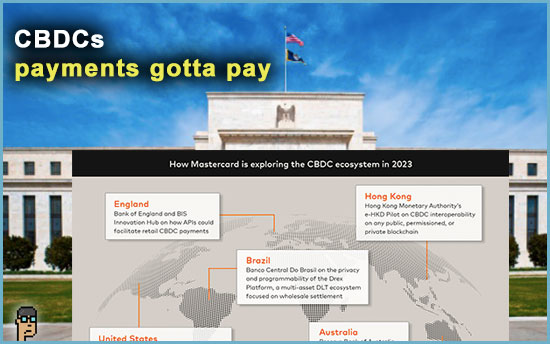CBDCs – Mastercard
Mastercard is continuing to evolve its corporate strategy and the world of Central Bank Digital Currencies (CBDCs) appears to clearly be a part of it as the company tries to stay ahead of whatever is next in payments.
Mastercard CEO Michael Miebach tweeted yesterday that his company is “partnering with several central banks to help them research new digital currencies projects. It starts with understanding what they want to achieve with this technology, then building in transparency, consumer privacy and stability.” In addition, Miebach names Ripple, Fireblocks and Consensys as part of “this new collaboration” for Mastercard’s “CBDC Partner Program.”
Miebach links to a Mastercard article which explains more details on his company’s plans titled: “Is safe the new sexy? CBDCs, trust and the evolution of money.” The company quotes Jesse McWaters, who leads global regulatory advocacy at Mastercard, as saying that “there are many questions that central banks need to consider… This includes the role of the private sector in CBDC issuance, security, privacy and interoperability – such as how a CBDC works with other commonly used payment mechanisms, what specific challenges CBDCs would solve and whether they’re even the right tool for the job.”
more tips:
Central Bank Digital Currencies (CBDCs) – Mastercard
CBDCs – Rep. Davidson
On Tuesday, Rep. Warren Davidson (R, OH), an active member of the House Financial Services Committee, expressed his continued abhorrence that any company – such as Ripple – would work on a CBDC tweeting, “Now, given that I am working to criminalize CBDC, rational people would understand I don’t want anyone to work on CBDC – not Satoshi, not Consensys, not the Fed, not even my mom.” Read his tweet.
Then yesterday, Consensys Senior Counsel Bill Hughes replied on X, “With all do respect [Warren Davidson], Consensys is not actively working on CBDC projects. In the past, we offered subject matter experts who could be hired to help consult with projects exploring blockchain applications, including CBDCs, but that aspect of our services ended a long time ago.” Read more.
UK – Travel Rule
The United Kingdom’s Financial Conduct Authority (FCA) yesterday reminded crypto asset companies that the “Travel Rule” implementations laid out by the Financial Action Task Force (FATF) are required for all UK crypto asset businesses beginning September 1. The “Travel Rule” is aimed at addressing anti-money laundering (AML) and counter-terrorist financing (CTF) concerns in crypto assets and allow authorities to understand who sent and who received crypto assets. Read yesterday’s FCA guidance.
There is some wiggle room in the new UK implementation as the FCA guidance states on cryptocurrency sender/receiver data: “Take all reasonable steps to establish whether the firm can receive the required information. If the firm cannot receive the necessary information, the UK cryptoasset business must still collect and verify the information as required by the Money Laundering Regulations (MLRs) and should store that information before making the cryptoasset transfer.”
CoinDesk reports that the UK’s Travel Rule implementation, and another on crypto-related advertising rule coming in October, has ground PayPal’s efforts to a halt and stands in contrast to the UK government’s publicly-stated desire to become a crypto hub. Read that one.
APAC – regulatory advances
The regulatory frameworks being quickly built out in APAC continue to attract attention as potential world leaders for crypto. A feature article on CNBC quotes Ong Chengyi, head of APAC policy at blockchain analytics firm Chainalysis saying “Hong Kong and Singapore are both similar in terms of the approach to maintaining very high regulatory standards, as well as being very proactive in creating an enabling environment for digital asset businesses.” Read more.
APAC – trading momentum
Derivatives marketplace CME Group announced that it will launch APAC Reference Rates for Bitcoin and Ether (so, a once-a-day reference rate for the U.S. dollar price of the two digital assets) on September 11.
Why does that matter? It speaks to crypto’s growth in APAC.
Giovanni Vicioso, Global Head of Cryptocurrency Products at CME Group explains in a press release, “Year-to-date, 37% of total crypto volume at CME Group has been traded during non-U.S. hours, with 11% of trades coming from the APAC region. As we continue to see more institutional clients use our Bitcoin and Ether futures products in active portfolios or structured products like ETFs, these APAC reference rates will allow market participants to more accurately and precisely hedge cryptocurrency price risk with timing more closely aligned to their portfolios.” Read more.
crypto staking and securities
Alluvial’s head of business and policy, Evan Weiss, makes his case in a Tweet thread on X yesterday as to why most crypto staking does not make for securities. You may recall the Securities and Exchange Commission Chair Gary Gensler has steadily taken the opposite view: staking has the properties of securities.
Weiss begins, ” In my 5 years working on staking legal issues I have yet to see case law or a contractual structure that better represents the relationship between a staker and service provider than that of liquid staking as a document of title. Here’s the high-level…” Read the argument.
more tips:
What is staking? – Bankrate
see more tips
Coinbase-Backed Group Loses Lawsuit Arguing Tornado Cash Sanctions Overstepped U.S. Treasury’s Authority – CoinDesk
Fed cracks down on small Washington bank linked to FTX – Politico
Judge in SEC-Ripple Case Opens Path to Partial Appeal After July Ruling – The Wall Street Journal
How criminals are using up-and-coming crypto ATMs to commit fraud (video) – CNBC on X
Use case: “Short video of what purchasing NFT-gated merch looks like with Shopify integration” – Zach Wong on X

